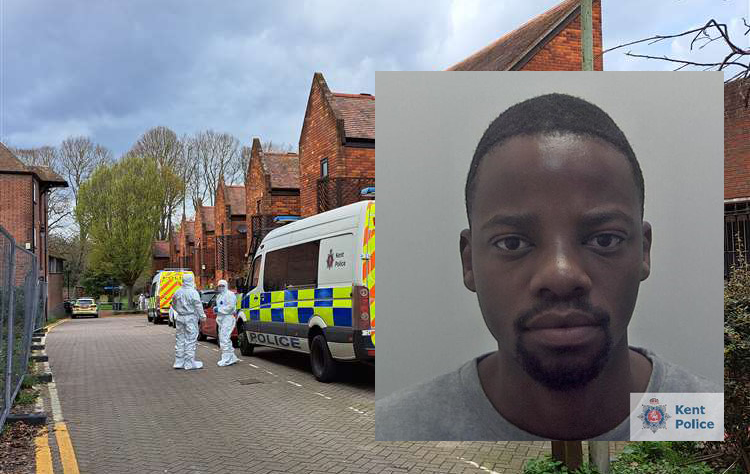- Crime and Courts
- No Comment
UK: Zim-born man faces life in jail for cocaine-rage murder of homeless lawyer

By Kent OnLine
UNITED KINGDOM: A man is facing life behind bars for the horrific killing of a disabled barrister who was living rough on Canterbury’s streets.
Sobantu Sibanda, the son of a university lecturer and social worker, was found guilty today of murdering Guy Malbec.
Sibanda, a 28-year-old former financial advisor, had admitted the manslaughter of the 51-year-old but denied murder, maintaining he only intended “some harm” to his victim.
His three co-defendants, Gavin Houghton, Keith Hall and Airidas Sakalauskas were alleged by the prosecution to be Sibanda’s “henchmen” and had “participated in and encouraged” the violent attack.
They each denied murder and manslaughter and were all found not guilty of both charges.
The verdicts were unanimous and returned after jury deliberations lasting just under six hours.
All four men had however admitted an offence of perverting the course of justice in relation to “cleaning up” the scene and deleting phone messages.
Sibanda, of Albert Street, Whitstable, Sakalauskas, 22, of Old Dover Road, Canterbury, Houghton, 50, also of Old Dover Road, and 51-year-old Keith Hall, of Athelstan Road, Thanington, will be sentenced by Judge Simon James on January 18.
Sibanda will be jailed for life with Judge James deciding the minimum term he will have to serve before eligible for parole. Sakalauskas, Houghton and Hall were warned that only immediate custodial sentences would be appropriate.
Canterbury Crown Court heard Mr Malbec, who relied on a wheelchair walking frame and stick due to a leg injury he sustained while living in Israel, was beaten to death in the early hours of Easter Sunday, April 9, with implements including his own wooden gavel and laptop.
Described as “very articulate and personable”, he had been living in a tent on the lower ground floor of the Castle Street car park for around two weeks, with Sibanda and Houghton as “neighbours”.
All five men were part of the city’s homeless community and knew each other from the Catching Lives charity day centre. Sakalauskas and Hall were not “on the streets” however but living in temporary accommodation, and Mr Malbec had previously stayed at Sakalauskas’s bedsit.

Such was the ferocity of the attack that Mr Malbec suffered a significant and fatal brain injury, as well as fractures to his nose, eye socket and four ribs.
As many as 18 separate injury sites were inflicted on his head and face, and marks left on his scalp were consistent with the gavel and the laptop base ventilation grill.
Hall himself later described the injuries to police as looking like those seen “in the 10th round of a Rocky film”.
Mr Malbec’s bloodied and battered body was not discovered until the following day. He was face down inside a vomit-stained sleeping bag pulled tight around his head and within a partially-zipped up tent.
In that time, Sibanda, Houghton and Sakalauskas had carried out an extensive clean-up of the scene, dumping several bin-bags containing as many as 80 items including bloodstained bedding, clothing and tent poles in council bins in nearby Gas Street, while Hall had deleted messages and call logs from his phone between himself and Houghton.
At the start of their six-week trial, prosecutor Caroline Carberry KC told jurors that Mr Malbec, who qualified as a barrister in the late 1990s but never practised, was a vulnerable man who posed no threat and died within a few hours of the “brutal and sustained” assault.
It was alleged the four defendants “did not like” their victim and, even after his death, had continued to demonstrate a “callous disregard” for him.
Zimbabwe-born Sibanda, described as “the main perpetrator” of the violence, was living in the car park, sharing a tent with Houghton, before Mr Malbec joined them at the site.
The court heard Sibanda was a self-confessed cocaine addict who had previously lived with his parents in Whitstable. But his drug habit cost him many jobs and eventually his family’s loyalty, said Ms Carberry, after he became involved in a money-laundering scam and falsely implicated his father.
Cocaine was also the reason for the violence, according to Sibanda. He told the jury that having bought £800 worth of the drug to sell on for profit in a bid to escape his own homeless situation, he discovered it missing from his tent and wrongly accused Mr Malbec of stealing it.

Giving evidence, he described how he was “raging and fuming” as he subjected his unfortunate victim to as many as 25 separate violent assaults in the space of just over an hour.
Mr Malbec, he said, was “cowering and crying” as he hit him repeatedly with his fists, his elbow, and forearm. He also dragged him across the ground by his injured leg and sat astride him.
The gavel was used to not only “pummel” his head but also to “mock” him, revealed Sibanda, while other treasured belongings, such as an expensive Tag Heuer watch, a family piece of pottery and a wooden chess set made by his grandfather, he cruelly destroyed.
A callous Sibanda revealed he was so irate that he even swallowed one of the chess pieces.
Some of the attack was captured on CCTV, albeit from a distance, sometimes obscured by concrete pillars, and without sound.
All four defendants were present in the car park and the footage showed the first blow being delivered by Sibanda at 4.41am – a push that sent Mr Malbec falling backwards to the ground and his tent collapsing – with the final strike of a punch at 5.53am.
For much of the time he was laying on the ground as Sibanda meted out the violence. At one point the CCTV showed him stopping to remove his bloodstained white bodywarmer and on other occasions he was pulled away by Hall and Houghton.
The pair, together with Lithuania national Sakalauskas, were said by the prosecution to have ransacked “in earnest” Mr Malbec’s belongings strewn across the sleeping area in their search for the cocaine and then any valuables.
The violence finally ended and the four men fled just before 6.30am, taking Mr Malbec’s phone with them so he could not call for help.
But Ms Carberry told the court although the attack stopped, it was “already too late” for Mr Malbec and, having eventually managed to crawl into Sibanda’s tent, he lost consciousness and was left to die “in the most horrific circumstances”.
